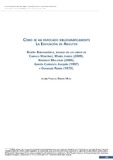| dc.rights.license | http://creativecommons.org/licenses/by-nc-sa/3.0/ve/ | |
| dc.contributor.author | Duarte Mora, Jeanne Yvanova | |
| dc.date.accessioned | 2018-02-15T19:41:20Z | |
| dc.date.available | 2018-02-15T19:41:20Z | |
| dc.date.issued | 2017-05 | |
| dc.identifier.issn | 0798-3069 | |
| dc.identifier.uri | http://www.saber.ula.ve/handle/123456789/44356 | |
| dc.description.abstract | Ante el desequilibrado proceso de masificación educativa, que han impuesto como políticas sociales en toda
Latinoamérica en los últimos veinte (20) años; se presenta formas discursivas que intentan explicar o generar intrigas,
en oposición a lo referido el acto educativo paso a ser solo un “Silogismo de palabras: se pasó de enseñar a profesar,
de instruir a dirigir e informar, de formar a crear y componer” en el cual el aprendizaje paso a ser secundario en la
educación de adultos, alejándose cada vez más del objetivo inicial para la cual fue creada la educación (para educar al
trabajador y al ciudadano, no al niño). En este propósito, diferentes intelectuales que enfocaron su vida en la práctica
educativa; promoviendo sus experiencias, sus prácticas, sus supuestos expositivos; han enfrentado las distintas
realidades institucionales-políticas-legales-administrativas y presupuestarias- convenios y vinculaciones- académicas-
curriculares y hasta contextuales. De ello, han surgido diferentes variantes (edadistas, de género, planificación,
presupuestaria) en la cual se profesa las Interpretaciones- Corrientes - Conocimiento y La práctica de educar y formar
al adulto. Ante ello se presenta el análisis de cuatro obras de gigantes de la praxis educativa, en las cuales se
reflejan: cómo ha evolucionado el enseñar al adulto, como ha pasado de ser “actor” a “espectador”, como pasó a ser
receptor de información y no de creador con su facilitador (como inicialmente se propuso). | es_VE |
| dc.language.iso | es | es_VE |
| dc.publisher | Venezuela | es_VE |
| dc.rights | info:eu-repo/semantics/openAccess | |
| dc.subject | Formación contínua | es_VE |
| dc.subject | Andragogía | es_VE |
| dc.subject | Educación de Adultos | es_VE |
| dc.subject | Formación indefinida | es_VE |
| dc.subject | Adiestramiento | es_VE |
| dc.subject | Artes y Oficios | es_VE |
| dc.subject | Gerencia | es_VE |
| dc.subject | la Animación de Grupos | es_VE |
| dc.title | Como se ha Enfocado Bibliográficamente la educación de adultos Reseña Bibliográfica, basada en los libros de Cabello Martínez, María Josefa (2009). Knowles Malcolm (2005), García
Carrasco Joaquín (1997) y Goguelin Pierre (1973). | |
| dc.title.alternative | How adult education has been bibliographically focused. Bibliographic Review. Based on the books of Maria Josefa Cabello Martinez (2009). Knowles Malcolm (2005), Garcia Carrasco Joaquin (1997) and Goguelin Pierre (1973) | |
| dc.type | info:eu-repo/semantics/article | |
| dc.description.abstract1 | Given the unbalanced process of educational massification, which have been imposed as social policies
throughout Latin America in the last twenty (20) years; there are discursive forms that try to explain or generate
intrigue, in opposition to what is referred to the educational act became just a “Syllogism of words: went from teaching
to profess, from instructing to directing and informing, from forming to creating and composing” in which learning became
secondary in adult education, moving further away from the initial goal for which education was created (to educate the
worker and the citizen, not the child). In this regard, different intellectuals who they focused their life on
educational practice; promoting their experiences, their practices, their supposed expositions; have confronted the
different institutional-political-legal-administrative and budgetary realities-agreements and linkages-academic-
curricular and even contextual. From this, different variants (age, gender, planning, budget) have arisen in which the
Interpretations-Currents - Knowledge and The practice of educating and training the adult are professed. This is the
analysis of four works of giants of educational praxis, in which they reflect: how has evolved teaching adults, as it has
gone from being “actor” to “spectator”, as it became a receiver of information and not creator with its facilitator
as originally proposed). | es_VE |
| dc.description.colacion | 418-423 | es_VE |
| dc.description.frecuencia | Cuatrimestral | |
| dc.publisher.pais | Venezuela | es_VE |
| dc.subject.centroinvestigacion | Centro de Investigaciones en Ciencias Humanas (HUMANIC) | |
| dc.subject.facultad | Facultad de Humanidades y Educación | es_VE |
| dc.subject.keywords | Continuous Formation | es_VE |
| dc.subject.keywords | Andragogy | es_VE |
| dc.subject.keywords | Adult Education | es_VE |
| dc.subject.keywords | Indefinite Formation | es_VE |
| dc.subject.keywords | Training | es_VE |
| dc.subject.keywords | Arts and Crafts | es_VE |
| dc.subject.keywords | Management | es_VE |
| dc.subject.keywords | Group Animation | es_VE |
| dc.subject.publicacionelectronica | Revista Fermentum | |
| dc.subject.seccion | Revista Fermentum: | es_VE |
| dc.subject.thematiccategory | Artes y Humanidades | es_VE |
| dc.subject.tipo | Revistas | es_VE |
| dc.type.media | Texto | es_VE |


